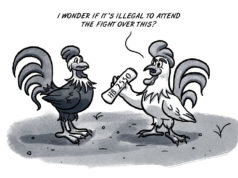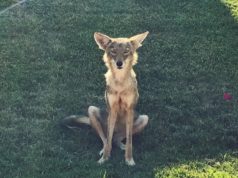(Editor’s Note: For your Caturday, NonDoc offers this essay on kittens, families and love. If anyone asks, you just cut up some fresh onions.)
My grandmother wasn’t a typical grandmother. She was the product of hard lessons learned well and situations that never quite ended up like she’d hoped.
Despite her occasional impatient disposition, she accepted the task of raising me when I was 5 years old. She was tired in every sense when she took me in, and the beginning of our relationship required a lot of forgiveness and understanding. I understood that she wasn’t good with children, and I forgave her because she chose to take me anyway. She understood that I was just a child, and she forgave me, mostly because I couldn’t help it. It wasn’t until I was older that I really came to understand my grandmother.
I was about 11 years old. We lived in a small house just big enough for the two of us and all of the pets I insisted upon having.
One hot August morning, our aging calico wandered up the front porch to eat, her recently plump belly noticeably smaller. Not wasting any time, I began to search for the kittens we’d been expecting. It wasn’t long before I found them hidden behind the thick rows of yellow canna lilies planted at the side of the house. There were five altogether: four huddled in a solid black ball, the fifth alone and motionless. At first, I thought it hadn’t survived, until I noticed the faint movement of its breathing when I leaned in.
It was black with a white underbelly that traveled up around his face, and a full set of white socks to match. It was a good deal smaller than the other kittens, its fur sparse, except for the patch on the nape of its neck. As momma cat curled around the other kittens, I gently moved the runt next to her to nurse. Through the following days, I checked on the kittens frequently. They were all doing well, even the runt, although he hadn’t changed much. But he was still alive.
Days later, school started back, and each morning I’d visit with the kittens while I waited for the bus. By this time, they were about a week old, and starting to open their eyes. Surprisingly, the runt was the first one to do so. His eyes were a foggy blue. I’d hold him in the palm of my hand and gently stroke his tiny head with a single finger. I named him “Slick.” As the kittens grew, my affection for the once-tiny, scrawny black and white did too. He was the only kitten I named, and he was the first one I’d pick to hold every morning as I waited for the school bus.
One evening, Granny and I were sitting on the porch as we usually did. Granny was in her chair, and I was sitting in my normal spot on the step. When Slick jumped up in my lap, I greeted him with an affectionate, “Hello, Slick.” He paced back and forth, before finally resting across my legs. I ran my fingers through the thick black fur on the back of his neck, and he responded with a low purr.
His brothers and sisters were lying a safe distance away. They didn’t really care to be held and rarely came up to the porch for any other reason but to eat.
Breaking the silence I said, “Isn’t it funny how much Slick has changed? I didn’t really think he would live. He was so small when they were born. Now, he’s doing better than all of them.”
I wasn’t really expecting a response, but Granny spoke, her voice unusually soft-spoken. She simply said: “Little girl, do you see what love can do?”
I didn’t reply. But in that moment, sitting on the porch with the only mother I’d ever had, I did see.
My affection for the once-frail kitten was a reflection of the love that had been given to me. And although my grandmother lacked in many areas, she loved me the only way she knew how — deeply — for no other reason than I needed it, which could be the most important reason of all.





















